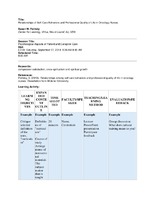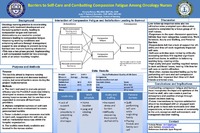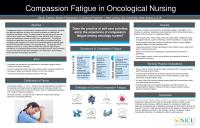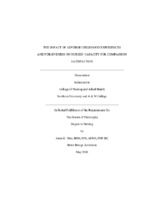| dc.description.abstract | <p>Session presented on Saturday, September 27, 2014:</p>
<p><strong>Purpose:</strong> The purpose of this study was to explore the relationships among the six components of self-care behaviors that include health responsibility, physical activity, nutrition, spiritual growth, interpersonal relations, and stress management and the three components of professional quality of life that include compassion satisfaction, burnout, and secondary traumatic stress.</p>
<p><strong>Methods:</strong> A descriptive correlational design was the most appropriate research design used to answer the research question: What are the relationships among the six components of self-care behaviors and the three components of professional quality of life? The sample selection for this study was a purposive sample of 121 Registered Nurses who belonged to the professional organization of ONS. The inclusion criteria were: 1) freely willing to participate, 2) at least 18 years of age, 3) currently practicing as a professional registered nurse, 4) currently employed in an oncology setting/unit, 5) member of ONS, 6) had access to a computer with internet capabilities, and 7) understood the written English language. The exclusion criteria were: 1) had no access to a computer with internet services, 2) unable to understand the written English language, 3) not currently working in an oncology setting, and 4) not a current member of ONS. A computed a priori power of analysis using Sample Power Version 2.0 was conducted to determine a minimum required sample of 98 oncology nurses. The researcher used a level of significance of .05, a power of .80, an effect size of .13. The heterogeneous sample was recruited randomly through ONS and completed the on-line survey through SurveyMonkey. There were 124 participants who started the survey but only 123 submitted their responses. Two of these participants did not complete the ProQOL and were removed from the data set. Three instruments used in this study included: 1) the Health Promotion Lifestyle Profile-II (HPLP-II), 2) the Professional Quality of Life Version 5 (ProQOL 5), and the Demographic Data Questionnaire (DDQ). Permission to use the HPLP-II and ProQOL 5 was obtained. The HPLP-II is a 52-instrument designed to measure behaviors theorized in dimensions of the health-promoting lifestyle, using a 4-point Likert scale from 1 = never to 4 = routinely. The HPLP-II includes a total scale and six subscales that include health responsibility, physical activity, nutrition, spiritual growth, interpersonal relations, and stress management. Validity and reliability were established. Individual raw scores for the total overall and subscales were calculated. Then mean scores were calculated for total overall scores and each subscale scores that could range from 1.00 to 4.00, with higher scores reflecting better health promoting behaviors. The ProQOL 5 was used to measure professional quality of life. The ProQOL 5 is a 30-item, self-report measure with three subscales: compassion satisfaction, burnout, and secondary traumatic stress. This instrument measured how frequently the respondents experienced the items captured within the scale, in the last 30 days using a 5-point Likert scale from 1 = never to 5 = very often. Validity and reliability were established. T-scores for each subscale were computed. Higher scores reflected more compassion satisfaction, burnout, and secondary traumatic stress. The DDQ, a 27-item instrument, captured the subjects personal information and workplace indicators. The DDQ was comprised of a combination of fill-in responses, single-select answers, select all that apply, and two contingency questions. Institutional Review Board approval was obtained through Widener Universitys IRB. There were minimal to no risks for participants in this study and several benefits. Confidentiality and anonymity of the participants were maintained. SurveyMonkey was the on-line service used to create the survey for this study. The researcher saved all data on a password-protected computer. The ONS member nurse was free to not participate or end the participation at any time during the completion of the on-line survey. Once submitted the on-line survey could not be deleted. Participation in this study was voluntary and no forms of coercion, deception, or covert data collection occurred. Completion and submission of the on-line survey constituted implied informed consent. The researcher used descriptive statistics and the statistical method of canonical correlation to analyze the data. Mean, median, standard deviation, and range were reported for all continuous variables. Other analyses used to analyze ancillary data were Pearsons correlation, t-test and ANOVA. Missing data was replaced up to 10% for each participant using the group mean for the missing data point.</p>
<p><strong>Results:</strong> The variables of spiritual growth from the HPLP-II and compassion satisfaction and burnout from the ProQol-5 contributed to canonical variate 1.The canonical variate accounted for 42% of the total variance which is explained by the linear combination of these three variables. Nurses with high spiritual growth and compassion satisfaction scores had lower burnout. The new variable or canonical variate has been termed, onco-spiritualism. Onco-spiritualism is a new concept created to explain the relationship of the three variables of spiritual growth, compassion satisfaction, and burnout in canonical variate 1. Onco-spiritualism describes a characteristic of an oncology nurse who, despite the rigors of caring for oncology patients and the effects of secondary traumatic stress, is able to use inner resources that puts the nurse in touch with the most inner balanced self and provides inner peace and pleasure from being able to work well in caring for oncology patients, in a caring and compassionate way. This then mitigates the job stress that is associated with chronic sources of emotional and interpersonal stress on the job. The characteristic of onco-spiritualism may facilitate fortitude and strength from ones own being fostering the nurses rising above conflicts that can cause burnout while managing cancer patients. This researcher proposes that when oncology nurses engage in spiritual growth they may experience more compassion satisfaction and less burnout. This finding is encouraging because it provides the oncology nurse population with a starting point to help alleviate some of the negative aspects of caring.</p>
<p><strong>Conclusion:</strong> 1) Nurses who participated in this study reported more frequently practicing healthy lifestyles. 2) Nurses who participated in this study reported less frequently practicing behaviors of physical activity, health responsibility, and stress management. 3) Nurses who participated in this study reported moderately healthy behaviors in areas of spiritual growth, interpersonal relations, and nutrition. 4) Nurses who participated in this study reported moderate levels of compassion satisfaction, burnout, and secondary traumatic stress. 5) The linear combination of low spiritual growth, low compassion satisfaction, and high burnout explained 42% of the variance of canonical variate 1. 6) Spiritual growth and interpersonal relations were the best, inversely related, predictors of burnout. 7) Interpersonal relations was the best, inversely related, predictor of secondary traumatic stress. 8) Oncology nurses with primary responsibilities for elderly parents/relatives at home had higher scores on secondary traumatic stress. 9) Oncology nurse who went to work sick had lower compassion satisfaction and higher burnout scores and secondary traumatic stress scores. 10) Oncology nurses who employers offer educational sessions regarding compassion satisfaction, compassion fatigue, burnout, and/or secondary traumatic stress had higher compassion satisfaction. 11) Oncology nurses who attended the educational sessions regarding compassion satisfaction, compassion fatigue, burnout, and/or secondary traumatic stress had higher compassion satisfaction.</p> | en |






